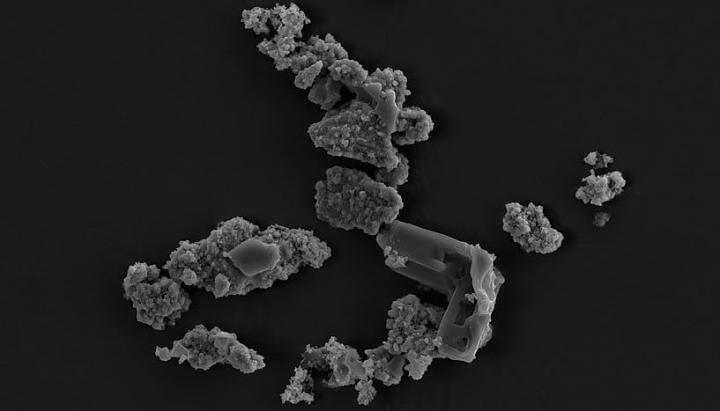Archaeon can crunch meteorite and feed on it

Credit: Tetyana Milojevic
Chemolithotrophic microorganisms derive their energy from inorganic sources. Research into the physiological processes of these organisms – which are grown on meteorite – provides new insights into the potential of extraterrestrial materials as a source of accessible nutrients and energy for microorganisms of the early Earth. Meteorites may have delivered a variety of essential compounds facilitating the evolution of life, as we know it on Earth.
An international team around astrobiologist Tetyana Milojevic from the University of Vienna explored the physiology and metal-microbial interface of the extreme metallophilic archaeon Metallosphaera sedula, living on and interacting with extraterrestrial material, meteorite Northwest Africa 1172 (NWA 1172). Assessing the biogenicity based on extraterrestrial materials provides a valuable source of information for exploring the putative extraterrestrial bioinorganic chemistry that might have occurred in the Solar System.
Archaeon prefers meteorites
Cells of M. sedula rapidly colonize the meteoritic material, much faster than the minerals of terrestrial origin. “Meteorite-fitness seems to be more beneficial for this ancient microorganism than a diet on terrestrial mineral sources. NWA 1172 is a multimetallic material, which may provide much more trace metals to facilitate metabolic activity and microbial growth. Moreover, the porosity of NWA 1172 might also reflect the superior growth rate of M. sedula“, says Tetyana Milojevic.
Investigations on nanometer scale
The scientists traced the trafficking of meteorite inorganic constituents into a microbial cell and investigated iron redox behavior. They analyzed the meteorite-microbial interface at nanometer scale spatial resolution. Combining several analytical spectroscopy techniques with transmission electron microscopy, the researchers revealed a set of biogeochemical fingerprints left upon M. sedula growth on the NWA 1172 meteorite. “Our investigations validate the ability of M. sedula to perform the biotransformation of meteorite minerals, unravel microbial fingerprints left on meteorite material, and provide the next step towards an understanding of meteorite biogeochemistry”, concludes Milojevic.
###
Publication in Scientific Reports
Tetyana Milojevic, Denise Kölbl, Ludovic Ferrière, Mihaela Albu, Adrienne Kish, Roberta Flemming, Christian Koeberl, Amir Blazevic, Ziga Zebec, Simon Rittmann, Christa Schleper, Marc Pignitter, Veronika Somoza, Mario Schimak, and Alexandra Rupert (2019) Exploring the microbial biotransformation of extraterrestrial material on nanometer scale. Sci. rep.
DOI 10.1038/s41598-019-54482-7
Media Contact
Tetyana Milojevic
[email protected]
43-142-775-2541
Original Source
https:/




